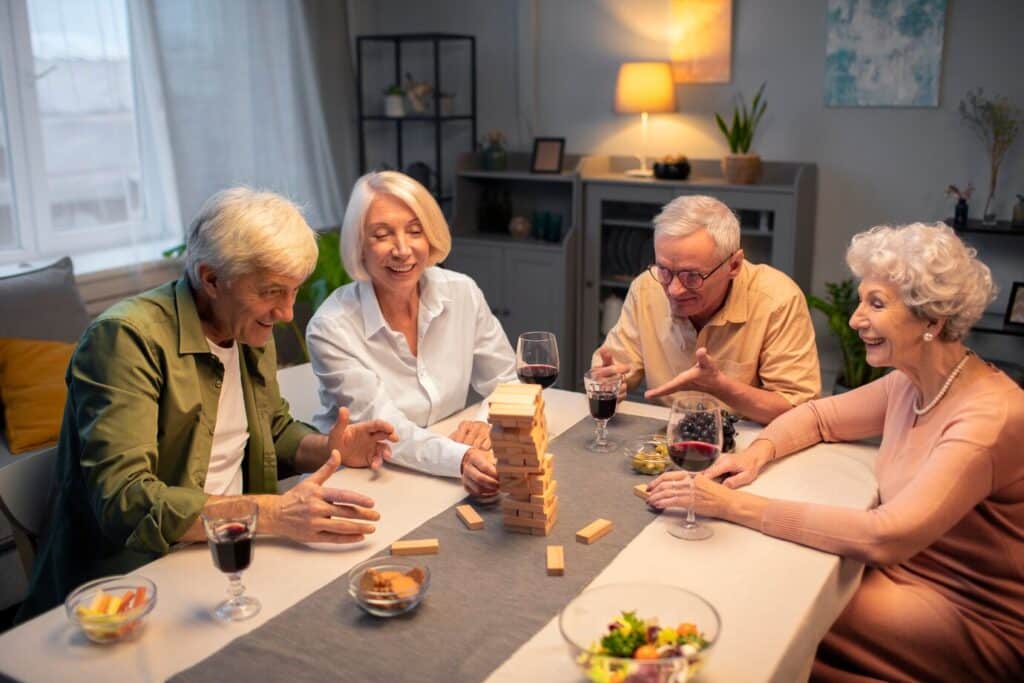At Westmont of Riverside, we believe that social connections in independent living are more than a perk—they’re essential to a fulfilling life. As seniors transition into a new chapter of independence, the ability to form meaningful bonds, engage in shared experiences, and participate in a vibrant community is critical to emotional and mental wellness.
Loneliness and isolation are common challenges for older adults, but there are powerful solutions. At Westmont of Riverside, we actively nurture social well-being through programs that encourage connection, stimulate the mind, and bring joy to daily life. From creative workshops to purposeful community service, everything we do is built around the importance of social connections in independent living.
To see how we foster these connections every day, visit our website: Westmont of Riverside.
The Power of Social Wellness in Independent Living
It’s no secret that building a strong social circle helps reduce stress, improve memory, and boost happiness. In fact, numerous studies—like those shared by the National Institute on Aging—show that social isolation can have adverse effects on health.
That’s why at Westmont of Riverside, we prioritize the importance of social connections in independent living. Seniors who form lasting friendships tend to experience improved mental sharpness, greater mobility, and a more positive outlook on life. Shared meals, engaging events, and mutual interests make it easy for residents to feel at home and truly thrive.
By participating in community events, residents strengthen their emotional support system while adding excitement and enrichment to everyday living.
Programs That Promote Social Engagement
Whether it’s diving into a creative passion, joining a lively discussion, or volunteering for a good cause, the opportunities to connect are endless at Westmont of Riverside.
Intellectual Activities that Spark Connection
Seniors flourish in environments where their minds are challenged and their voices are heard. That’s why our intellectual programming includes:
| Activity Type | Description | Social Benefits |
| Book Clubs | Discuss novels and ideas | Builds shared interests |
| Trivia Nights | Team-based games and fun facts | Encourages bonding |
| Guest Lectures | Talks from experts | Promotes dialogue and curiosity |
| Language Classes | Learn and speak new languages | Strengthens group learning |
| Discussion Groups | Dive into hot topics | Sparks new friendships |
These activities go beyond mental stimulation. They serve as meaningful ways to build social connections in independent living by giving residents shared goals and vibrant conversations.
More on the value of social wellness in active communities can be found in this blog.
Creative Workshops to Express and Connect
Art has a powerful way of bringing people together. Our creative expression workshops offer:
- Collaborative Projects: Team up with fellow residents on murals, quilts, or seasonal decor.
- Storytelling Through Art: Use painting or crafting to share your life experiences.
- All Skill Levels Welcome: From beginner to advanced, everyone can participate and grow.
Creative spaces allow seniors to open up, learn new things, and deepen their sense of community.
Learn more about social and recreational activities that make life joyful at Westmont.
Volunteering and Giving Back
Nothing builds community like working toward a shared cause. Residents at Westmont of Riverside participate in a variety of volunteer projects that promote kindness and connection, including:
- Organizing donation drives
- Handcrafting blankets or scarves for those in need
- Supporting local food banks
These acts of service not only make a difference in the larger community but also help residents build social connections in independent living through teamwork and compassion.
As shown in this article from SeniorLiving.org, seniors who volunteer tend to live longer, happier lives.

Staying Sharp Through Social Learning
Guest Speaker Events
Our guest lectures are popular not just for the knowledge they offer, but also for the camaraderie they inspire. With interactive formats and thought-provoking topics, residents are encouraged to:
- Ask questions and share ideas
- Reflect and connect with peers
- Find common interests through discussion
These sessions are crucial for fostering intellectual growth and highlighting the importance of social connections in independent living.
Trivia as Team Bonding
Friendly competition is a fantastic way to connect. Trivia nights at Westmont of Riverside are designed to:
- Boost memory
- Encourage teamwork
- Create lasting memories
Whether you win or just enjoy the laughter, trivia becomes more than a game—it becomes a chance to belong.
Fitness as a Social Outlet
Physical well-being and social wellness often go hand in hand. At Westmont, our wellness activities are tailored to support both.
Stay Active with Friends
- Walking Groups: Explore the grounds together and start your day with conversation and nature.
- Dance Classes: Try out ballroom or line dancing—great for cardio and laughter.
- Gentle Fitness Classes: Yoga, tai chi, or chair exercises for every level.
These sessions ensure that fitness is never solitary. Instead, they offer another way to build social connections in independent living.
Creative Hobbies That Spark Joy
Social interaction doesn’t need a formal setting. Organic moments often come from simple hobbies like:
- Cooking classes
- Gardening clubs
- Craft circles
- Music jam sessions
Residents teach, learn, and grow from each other. These organic exchanges deepen bonds and affirm the importance of social connections in independent living every day.
Celebrating Our Diverse and Inclusive Community
Diversity brings color and depth to community life. At Westmont of Riverside, we celebrate every resident’s story. Cultural potlucks, inclusive holiday celebrations, and interest-based groups all support connection and understanding.
Technology classes ensure residents stay in touch with faraway family, while group chats and clubs create space for all voices to be heard. It’s this inclusive spirit that makes Westmont a warm and welcoming home for everyone.
Ready to Build Meaningful Connections? Let’s Talk!
At Westmont of Riverside, social connections in independent living aren’t just encouraged—they’re embedded into every part of our community. Through creativity, purpose, laughter, and learning, our residents build friendships that uplift their daily lives.
When you join our community, you’re not just finding a place to live—you’re discovering a vibrant lifestyle where every day offers new connections and shared moments.
📞 Call us at 951-697-2100 or schedule a tour to see how Westmont of Riverside can help you foster lifelong friendships and joyful living.
Let’s build something beautiful—together.
How Do The Costs Of Moving Into A Quality Senior Care Community Compare With The Costs Of Staying At Home?Compare The Costs of Senior Living vs Staying at Home
Frequently Asked Questions
How much does memory care cost in California?
The cost of memory care in California can vary depending on location, community amenities, and the level of care needed. On average, families can expect to pay between $5,000 and $7,500 per month for specialized memory care services. This cost typically includes housing, meals, 24/7 supervision, and structured activities tailored to residents with memory challenges. Some communities may charge additional fees for higher levels of personal care or medical support.
What is the difference between memory care and dementia care?
Memory care is a specialized type of senior living designed for individuals with memory-related conditions, including Alzheimer’s and other forms of dementia. It focuses on providing a safe environment, structured routines, and activities that promote cognitive function and reduce confusion. Dementia care, however, is a broader term that refers to any type of care given to people living with dementia, whether in-home, in assisted living, or in a dedicated memory care community. In short, memory care is a setting, while dementia care refers to the type of support provided.
How long do individuals typically reside in memory care?
The length of stay in memory care depends on many factors, including the stage of the condition, overall health, and available family support. On average, residents may live in memory care for two to three years, though some remain longer if their needs are met effectively. Many families choose memory care when symptoms progress beyond what can be safely managed at home. The goal is to ensure residents maintain quality of life, safety, and dignity throughout their stay.








